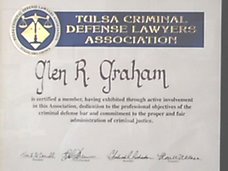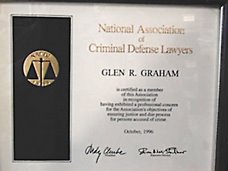According to most criminal defense lawyers, this is still good law, although few Judges will follow it.
Note: Article written by law enforcement counsel
You got nothing to lose and you might renew Oklahoma State law........Oklahoma Bar JournalArticles Vol. 72, No. 15, May 12, 2001 SCHOLARLY ARTICLE
http://www.okbar.org/obj/articles_01/sa051201.htm
Must Police Officers Administer Miranda Warnings Before Asking forConsent to Search?By Scott Rowland who at the time served as Oklahoma Bureau of Narcotics and Dangerous Drugs Control General Counsel, heading up the Bureau's Legal section.Abbreviated / shortened version of article above: There is, perhaps, nothing more axiomatic in criminal law than the rule that police interrogating one who is in custody must advise them of certain constitutional rights, and that if they ask for a lawyer or exercise their right to remain silent, interrogation must cease.1 If a person in custody is not advised of his or her rights, or if they are so advised, invoke those rights and are subsequently questioned in derogation of them, any statements they make will besubject to suppression.2 What is not nearly so clear for criminal lawyers in Oklahoma is whether asking for consent to search is treated as interrogation so that any consent given after a violation of Miranda would also be subject to suppression just as if it were an incriminating statement. Unfortunately, the state of the law in Oklahoma is much more turbid, dating principally to Schorr v. State, a 1972 decision of theOklahoma Court of Criminal Appeals.3 Although subsequent rulings have seriously undercut the legal moorings of Schorr, the court's failure to explicitly overrule it has allowed a wake of confusion spanning nearly three decades. Dennis v. State, 1999 OK CR 23, 990 P.2d 277 (Okla. Crim. App. 1999) (holding that, unlike the Fifth Amendment, Oklahoma Constitution does require a suspect during custodial interrogation be told of the presence of his lawyer on the premises).The Fitful Evolution of the Oklahoma Rule In Schorr, [Schorr v. State, 499 P.2d 450 (Okla. Crim. App. 1972).] the defendant was given a facially defective version of the Miranda warnings, and subsequently consented to a search of his van which yielded marijuana. The Court of Criminal Appeals reversed his conviction. "We must legally conclude that a consent to search, givenduring custodial interrogation must, as a matter of law, be precededby a proper Miranda warning."8 Specifically, the wording used by the officer in giving the warning indicated to the defendant that alawyer would be appointed when he went to court; this was found to be infirm, since Miranda requires advising the suspect a lawyer will be appointed prior to any questioning.9
The implied holding of this caseis that asking for consent to search is the functional equivalent of interrogation, although this phrase is not used by the Schorr Court.The Schneckloth case does not squarely address whether Miranda warnings are required before asking for consent to search, and infact by its terms is limited to cases where the one being asked to give consent is not in custody.25 However, the opinion does stress repeatedly that in assessing the totality of the circumstances, no single factor should be controlling, and thus an over whelmingmajority of state courts, and all federal appellate circuits, employ Schneckloth's "totality of the circumstances" test for voluntariness, and view the administering of Miranda rights as one factor to be weighed in that analysis. The totality of the circumstances test is also used in Oklahoma to test the voluntariness of consensual searches, but a requirement of Miranda warnings if the suspect is incustody appears to be an additional burden of the State.The first of these post-Schorr cases was Case v. State 10 in which aconsent to search was found to be involuntary because there was no evidence in the record that he had been given the proper Mirandawarnings prior to giving the consent while he was in custody. "It is clear that the defendant was in custody and under interrogation atthe time the Sheriff sought permission to search the truck. There isno evidence in the record that he was informed of his Miranda rights as required by Schorr v. State."11"While it is true that a request for consent to search made after defendant requests counsel is improper as it is the functional equivalent of express questioning, see Kreijanovsky v. State, 706P.2d 541, 545 (Okl.Cr.1985), appellant has failed to establish that he requested counsel."
Conclusion: In summary, the current body of law in Oklahoma surrounding this issue is ambiguous at best. For example, a District Court Judge facedwith the issue in a criminal case might see the remnants of Schorr,Kreijanovsky, and Trice and conclude that the Miranda doctrine has full application to law enforcement requests for consent to search.But further research would yield an apparently opposite view point by the Court of Criminal Appeals in Cannon, and still further research would show Oklahoma's practice starkly different from federal caselaw. This last point alone may cast severe doubt on the continued life expectancy of the cases following Schorr, given the OklahomaCourt of Criminal appeals' long history of interpreting Oklahoma's Constitution closely in accord with the U.S. Constitution and caselaw on Fourth and Fifth Amendment protections.32
Must officers administer Miranda warnings before asking consent to search?
Subscribe to:
Post Comments (Atom)






1 comment:
what if one makes voluntary statement after being handcuffed and arrested?
Post a Comment